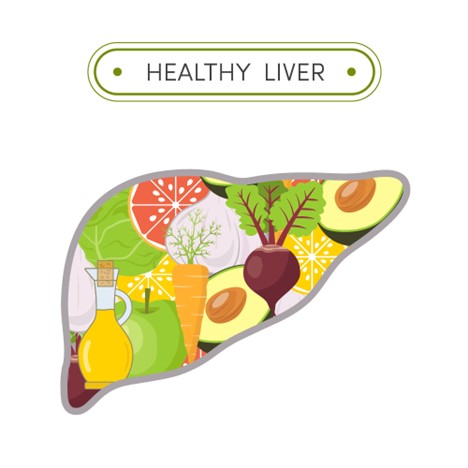A Dietary Guide to Gifting Your Fatty Liver a Long Life

Decoding SGPT: Your Personal Guide to Liver Health Maintenance
28 Feb 2024
Our body, a complex machine, runs many covert operations that are essential for our well-being. Among them is the diligent work of our liver, a vital organ that tirelessly performs over a hundred different functions. One of its main duties involves producing key enzymes, including Serum Glutamic Pyruvic Transaminase (SGPT). Monitoring this crucial liver enzyme level offers valuable insights into the health of your liver.
Keeping tabs on SGPT levels through regular monitoring is more significant than most people realise. This isn’t just a routine lab test; it’s an important part of comprehensive healthcare. Elevated levels can serve as early warning signals for various liver conditions, including cirrhosis and hepatitis. Understanding SGPT and its role in our body can lead us to make proactive decisions about our health, diet and lifestyle.
This blog aims to shed light on the importance of SGPT monitoring for maintaining liver health. We will delve into the correlation between SGPT and diet, and how understanding liver enzyme levels can be your first step towards optimal health.
Decoding SGPT: Your Liver’s Very Own SOS Signal
SGPT, known as Alanine Transaminase (ALT) outside India, is a protein produced mainly by the liver. It helps in the process of metabolising proteins, and only a small amount is normally found in our bloodstream. An inflated SGPT level can be an early warning sign of liver damage, indicating the need for further investigation. It’s like your liver sending you an SOS signal, and regular SGPT monitoring becomes pivotal in maintaining good liver health.
Numbers Don’t Lie: Interpreting SGPT Levels
SGPT levels are measured in units per litre of blood (U/L) and the normal range is between 7 and 55 U/L. However, this range varies for men and women and slight variation in the range might occur depending on the laboratory and style of testing. Any number beyond this range calls for attention. Increased levels may suggest damage or diseases like hepatitis, cirrhosis or jaundice. However, having high SGPT numbers doesn’t necessarily mean you have a severe liver condition; it could be due to alcohol use or medication side effects too. Understanding these numbers is crucial to initiate appropriate medical action. These numbers should only be interpreted by a qualified healthcare provider and self-diagnosis of any kind should be avoided.
The Spotlight on Monitoring: Why Regular Checks Matter
Monitoring your SGPT levels regularly is as important as keeping tabs on your blood pressure or cholesterol levels. This often-overlooked factor plays a vital role in the early detection of any possible liver ailment. Regular monitoring can also indicate the effectiveness of any ongoing treatment for liver diseases by revealing any changes in the SGPT levels. Therefore, an annual liver function test, which includes monitoring of SGPT, should be part of your healthcare routine.
Reading Between Lines: Factors Impacting SGPT Levels
Several factors can influence your SGPT levels. Obesity, diabetes and high cholesterol are some conditions that can increase these levels. Certain medications like statins or over-the-counter painkillers can also elevate SGPT. Alcohol use, viral hepatitis and even strenuous exercise can influence these enzyme levels. Recognising the factors that impact your SGPT levels can help you make informed lifestyle choices and maintain a healthy liver.
Eating Right: Can Your Diet Affect Your SGPT?

A correlation exists between SGPT and diet! Your diet plays a significant role in maintaining optimum SGPT levels. Foods like spinach, broccoli and nuts, which are high in Vitamin E, can help lower these levels. Similarly, foods rich in Omega-3 fatty acids such as fish, flaxseeds and walnuts may also benefit your liver health. Conversely, excessive consumption of fatty foods, sugars and alcohol can escalate SGPT. So yes, your diet can indeed affect your SGPT levels and ultimately, your liver health.
In conclusion, SGPT monitoring is akin to installing a vigilant security guard for your liver. It’s not just about being health-conscious; it’s about being smart and proactive in maintaining our wellbeing. Regular monitoring of SGPT can give an insight into your liver health and offer a chance to course-correct if required. With the right lifestyle choices, like improved diet patterns, and by embracing regular health check-ups, you can chart a path to robust liver health.
At TatvaCare, we believe that understanding your body should not be a complex process wrapped up in medical jargon. We’ve created a platform that simplifies health data for patients just like you. Your health is our priority. For any further queries or to keep track of your liver enzyme levels, get in touch with us at tatvacare.in. We’re ready to support you on every step of your health journey.

FAQs
Q. How does regular SGPT monitoring contribute to liver health?
A: Regular SGPT monitoring plays a pivotal role in liver health as it helps us identify early signs of liver damage. This enzyme leaks into the bloodstream when the liver is injured, thus serving as a reliable indicator of liver health.
Q. What can cause high SGPT levels in the body?
A: High levels of SGPT can be caused by several factors including viral hepatitis, alcohol consumption, obesity or having certain medications. Even conditions like celiac disease or mononucleosis can boost SGPT levels. It’s essential that you discuss any sudden increase in your SGPT levels with your doctor.
Q. How often should I get my SGPT levels checked?
A: The frequency of SGPT tests largely depends upon your current health status and any existing medical conditions you may have. However, if you’ve been diagnosed with a condition that could affect your liver, such as hepatitis or cirrhosis, then regular monitoring every 6 months is generally recommended.
Q. Are there symptoms associated with elevated SGPT levels?
A: Elevated SGPT levels are often symptomless in the initial stages. However, as liver damage progresses, symptoms like jaundice (yellowing of skin and eyes), fatigue, swelling in the abdomen, nausea and vomiting might appear. Early detection through regular testing can help manage these symptoms better.
Q. Can I lower my SGPT levels naturally?
A: Yes, lifestyle modifications such as maintaining a healthy weight, eating a balanced diet and limiting alcohol consumption can help lower your SGPT levels naturally.

Medically reviewed by
Dr. Krunal Chaudhari 
MBBS, MD
Recent Blog
- AI in Healthcare: Not a Threat, but a Smart Ally
- Your Clinic. Your Website. Your Brand.
- CDSS – Revolutionising Diagnosis with AI-Powered Clinical Decision Support System
- Handwritten to Digital in Seconds: SmartSync Converts Prescriptions Instantly
- Voice Rx by TatvaPractice: A Smarter Way to Digitise Prescriptions
Archives
Categories
- Asthma (20)
- Diabetes (15)
- Fatty Liver (20)
- High Blood Pressure (2)
- High cholesterol (2)
- Hypertension (2)
- Insulin Resistance (1)
- Obesity (8)
- PCOS (6)
- TatvaPractice (13)
Let’s Connect
Quick contact




